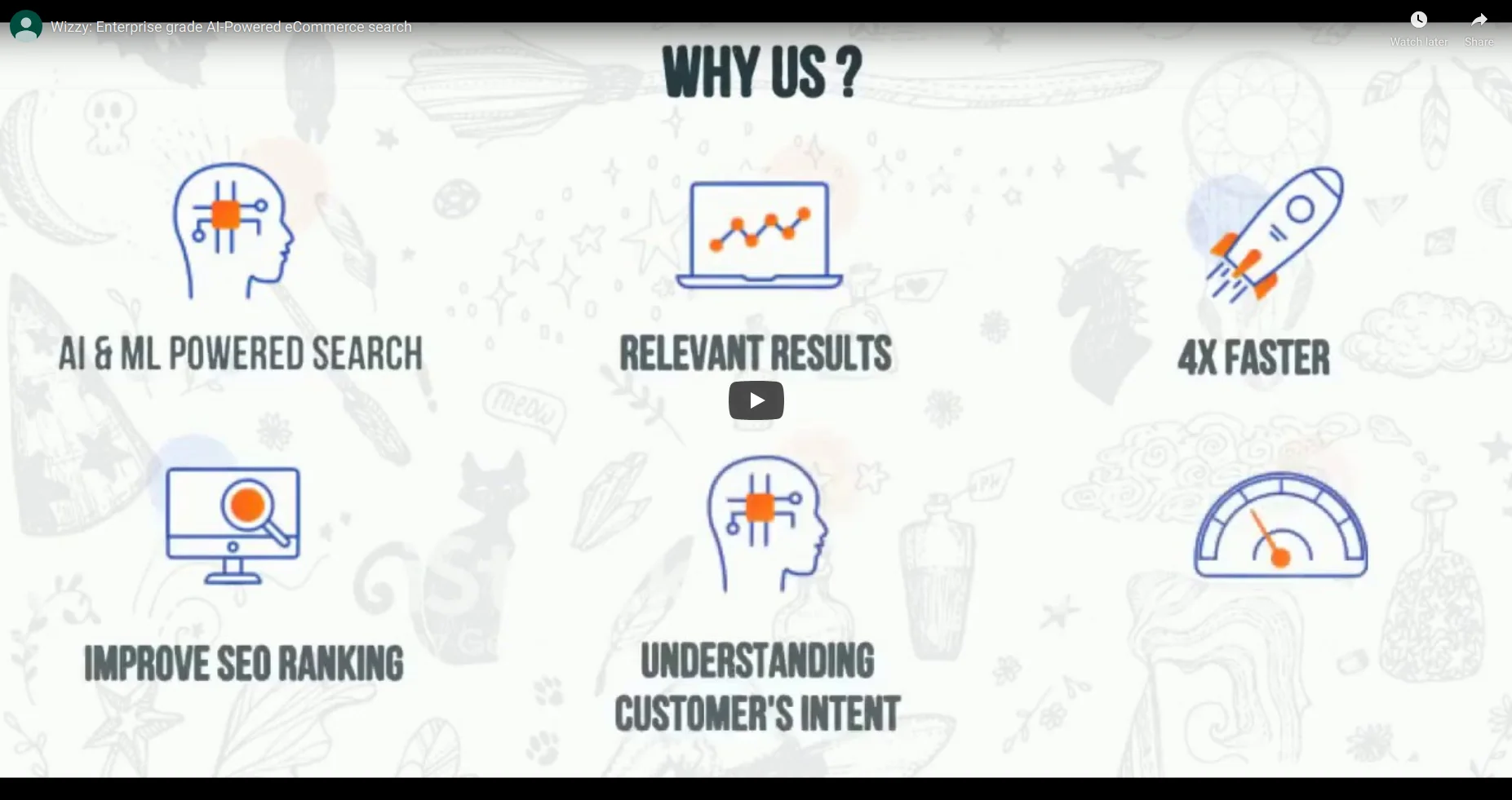How important is site search for Amazon?
How often do people use Amazon to search for products?
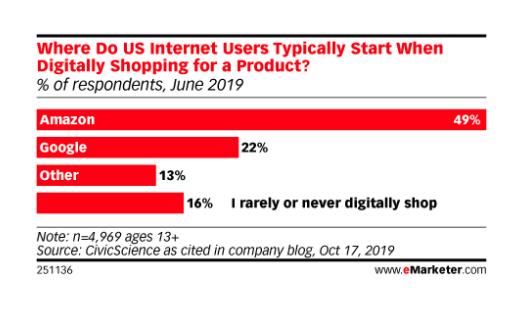
Source: eMarketer
A 2019 CivicScience survey (per eMarketer) found that 49% of US internet users aged 13 and older preferred starting their product searches on Amazon. Among those who usually shop online, the share starting on Amazon was about 58%.
So, this begs the question—how does the Amazon site search work?
What’s analysed in this blog post
| ? Why are we decoding the Amazon search bar? ? 1 – Amazon’s big, prominent search bar ? How is it different from independent ecommerce stores? ? 2 – How Amazon’s search suggestions are dynamic and optimised ? How is it different from independent ecommerce stores? ? 3 – How Amazon’s dynamic filters refine search ? How is it different from independent ecommerce stores? ? 4 – How Amazon’s dynamic product recommendation works ? How is it different from independent ecommerce stores? ? 5 – Amazon site search is mobile optimised ? How is it different from independent ecommerce stores? ? 6 – Amazon doesn’t share search insights with its sellers ? 7 – What is Amazon allegedly accused of doing with search insights? ? What can sellers do about it? ? How Wizzy transforms site search for ecommerce stores |
Why are we decoding the Amazon search bar?
We both can agree that the Amazon search bar does its job effectively in helping shoppers find what they want very quickly.
If shoppers find what they are looking for quickly, most of them end up making a purchase.
So, better search results = higher sales.
Our argument is this—why can’t independent stores (ecommerce sites) use site search the way Amazon does?
Before we get into that, let us look at how Amazon search works.
In this analytical blog post, we will look at what makes Amazon’s site search so good and how it is different from the site search that appears on independent ecommerce sites.
Let us break down the Amazon Search and see how it makes life easy for shoppers and boosts sales.
1 – The Big, Prominent Search Bar
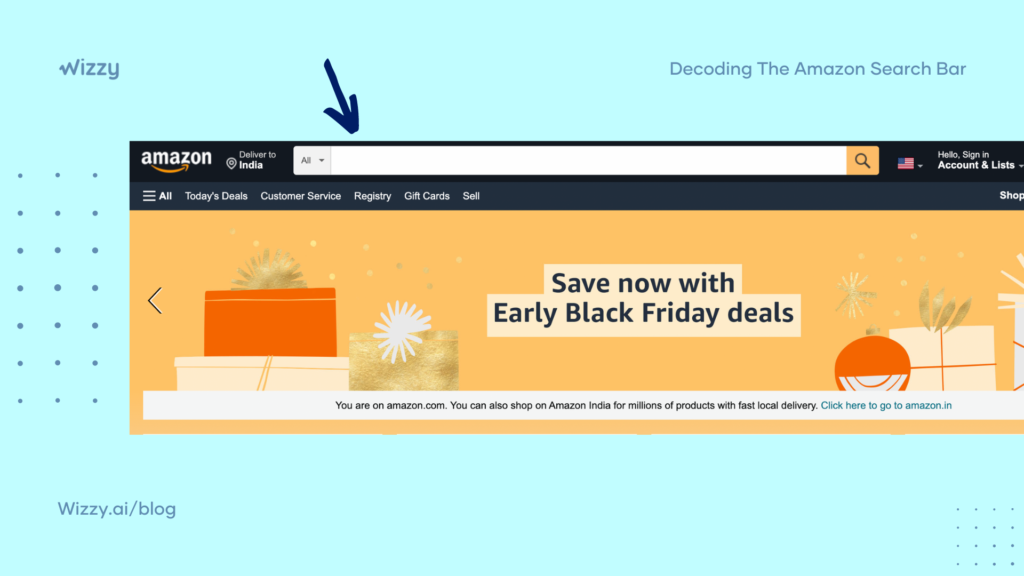
The moment you visit Amazon’s homepage, you find the search bar at the top.
It is big, easily visible; in fact, most of us directly tap/click on it to start searching.
How is it different from independent ecommerce stores?
Independent ecommerce stores rarely focus on making the site search the hero of their site.
A lack of a sophisticated search feature is the primary reason why store sites don’t focus on on-site search.
This means that while Amazon is designed so that shoppers mostly use search to find a specific product, shoppers can also browse through the catalog of products without using the search feature at all.
In contrast, independent ecommerce sites depend wholly on their shoppers searching through their product catalog to find what they want.
Amazon makes searching for products fast and easy.
2 – Search Suggestions Are Dynamic And Optimised
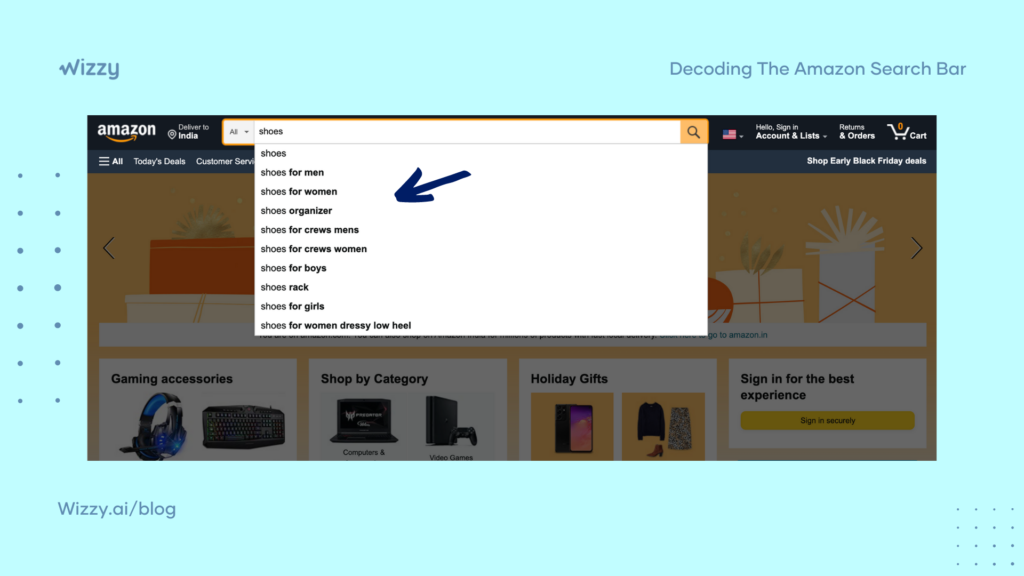
As you type your query on the Amazon search bar, you immediately see search suggestions below the bar.
Many technical aspects have to work in tandem and at speed to show search suggestions quickly and accurately.
Did you know that these search suggestions change often?
Shoppers go to Amazon to buy anything literally under the sun—from groceries, seasonal decorative items, gifts, gadgets, etc.
This means that shoppers visit Amazon multiple times a month and many times a year to fulfill their shopping needs.
As the shopping requirement changes, the Amazon search bar changes its search suggestions as well.
Amazon search has to learn from every search query and the seasonality to understand the context of searching.
For example, the search term ‘decoration items for…’ can show suggestions of Diwali in October but refine it to Christmas in November and December.
The formatting of the suggestions makes it easy for shoppers to select the relevant suggestion to refine their search.
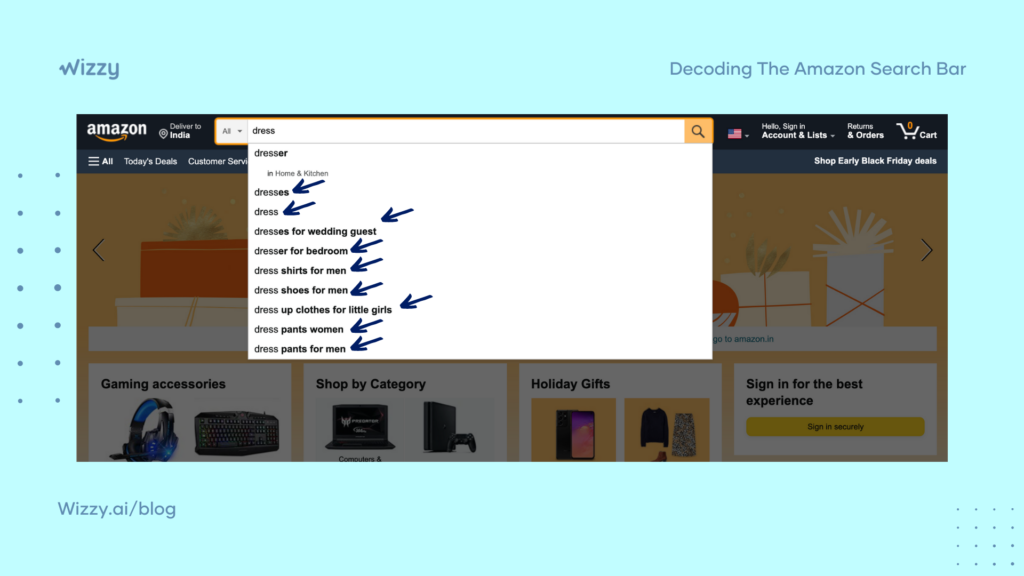
Notice how the theme of the search terms suggested is in bold?
What does this tell us?
Once shoppers type their search query, Amazon quickly understands the most crucial aspect of a search suggestion—the theme.
It offers several relevant themes to help shoppers refine their search immediately.
How is it different from independent ecommerce stores?
Getting search right needs the technology behind it to understand the product catalog and all the product terms and contextually understand natural language.
While Amazon can spend millions of dollars on their search technology, what can independent ecommerce stores do to make their site search sophisticated?
That is why we built Wizzy, the search wizard. It brings you technology that integrates with your product catalog and information and uses AI and machine learning to understand natural language constantly. Visit Wizzy.ai to learn more.
3 – Dynamic Filters That Refine Search
Once shoppers type and select their query, they are taken to the search results page.
Similar to search auto-suggestions, the filter on the left side of the search results page changes according to the product category and seasonality.
This filter understands what shoppers want—fast delivery, highest rated products, and price sensitivity—and highlights these aspects to help shoppers refine their search further.
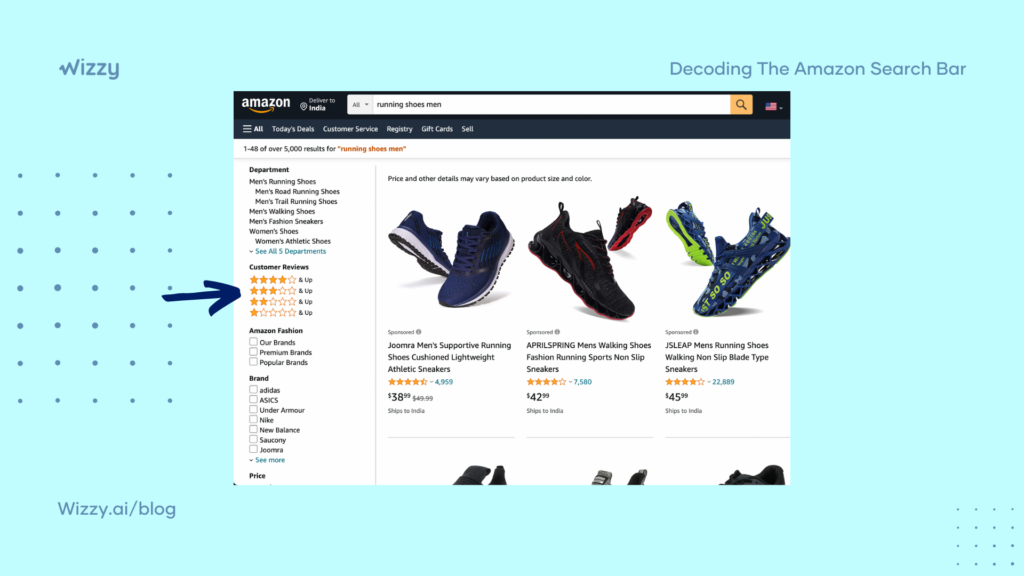
Notice how the first refinement option on the left filter is delivery, followed by product category, reviews, brands, and prices.
Amazon’ search technology works behind the scenes to understand:
- The natural language in search terms, and
- The time of the year.
To change the aspects of the filter regularly.
How is it different from independent ecommerce stores?
While most ecommerce stores have filters to help shoppers refine their search by availability, price, size, color, etc., very few have access to top-class search technology that can regularly match shopper intent and the dynamism of seasonality.
4 – Dynamic Product Recommendation At The Top
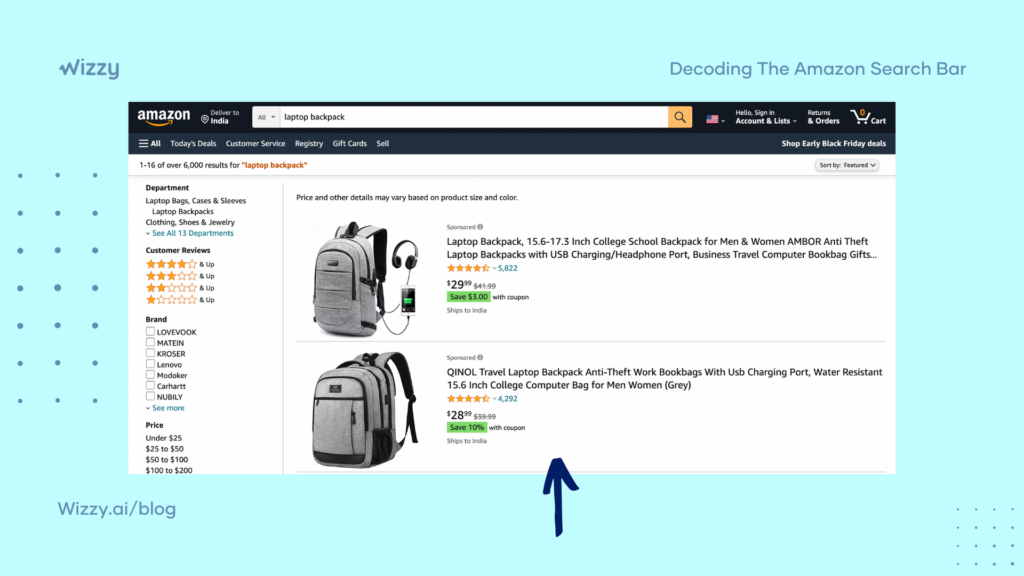
Amazon’s search algorithms are at play to constantly refine product recommendations—both organic and sponsored results.
Allowing brands to sponsor products on search results pages is a big money spinner for Amazon that brings in additional revenue.
This is the same section (top of the page) where Amazon shows its in-house brands.
We will explore the not-so-good aspect of how Amazon uses its search in another section down below.
How is it different from independent ecommerce stores?
Most independent ecommerce sites offer sorting or refinement options on their search results page, but their usage is minimal. It is restricted to sorting products by price, availability, and a few other factors.
This is where sophisticated search technology can transform an ecommerce site search instantly. But many ecommerce store owners believe that intelligent, self-learning search technology is either—out of reach for independent stores or requires a large team of developers to build it.
This is why we built Wizzy, the search wizard. Our idea is to democratize cutting-edge search technology built on the latest AI and machine learning technologies and can constantly learn the context of product search and show shoppers what they want quickly and accurately.
5 – Amazon Site Search Is Mobile Optimised
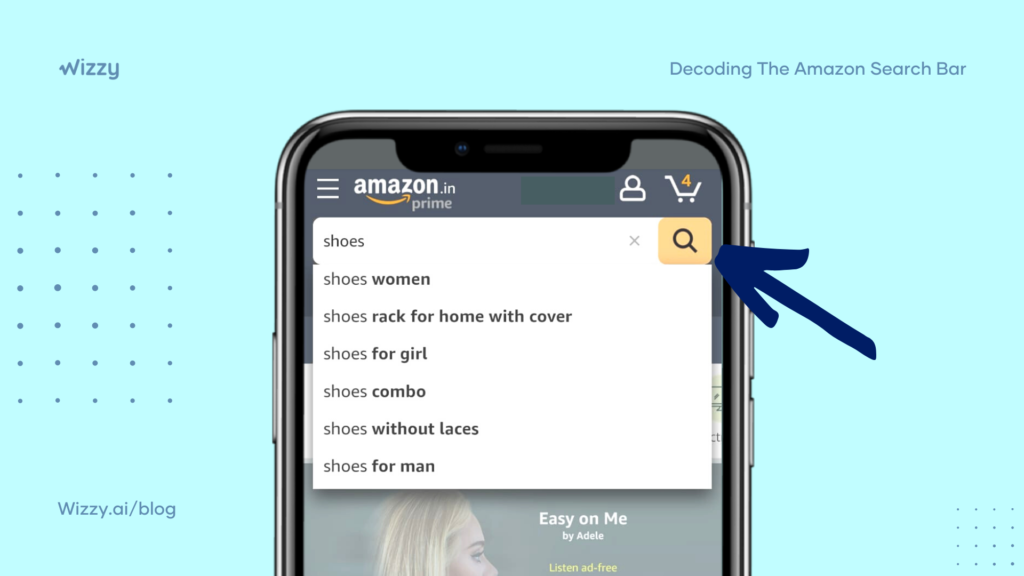
According to Staista, Amazon generates ~30% of traffic and sales from mobile devices—16.6% from Amazon mobile site and 13.6% from Amazon’s mobile apps.
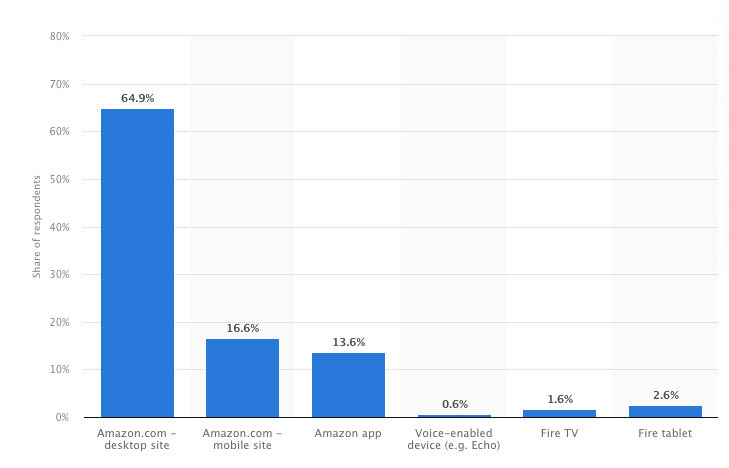
To address a third of its traffic and sales opportunities, Amazon delivers mobile search experiences similar to its desktop site; searching on the mobile site and app is equally quick, relevant, and accurate.
The moment shoppers open the Amazon app/mobile site and click on the search bar at the top, the screen is filled with search suggestions from search history.
As shoppers start typing the search query, the auto-suggestions kick in, just like the desktop site.
How is it different from independent ecommerce stores?
Search experiences on most independent ecommerce sites are the same as their desktop sites, which is where the similarities end with Amazon.
Search experiences and their impact on sales need to be improved a lot.
6 – Amazon Doesn’t Share Search Insights With Its Sellers
Amazon constantly learns a lot about what and how shoppers search and buy on the platform. But the truth is that while Amazon shares sales-related analytics with its sellers, it keeps all the insights generated from its site search to itself.
This is why platforms like Shopify and Magento (among others) are seeing an influx of entrepreneurs creating independent sites to sell directly to consumers, reducing dependence on aggregators like Amazon.
If sellers don’t know what and how their potential customers search for products, what hope do they have to succeed on Amazon sustainably?
While keeping the search insights close to its heart, Amazon has been allegedly accused of using the same search insights to nefarious purposes, detriment to its millions of sellers.
7 – What Is Amazon Allegedly Accused Of Doing With Search Insights?
What would you do if you knew your best-selling products, what your shoppers search and buy the most, and control the platform?
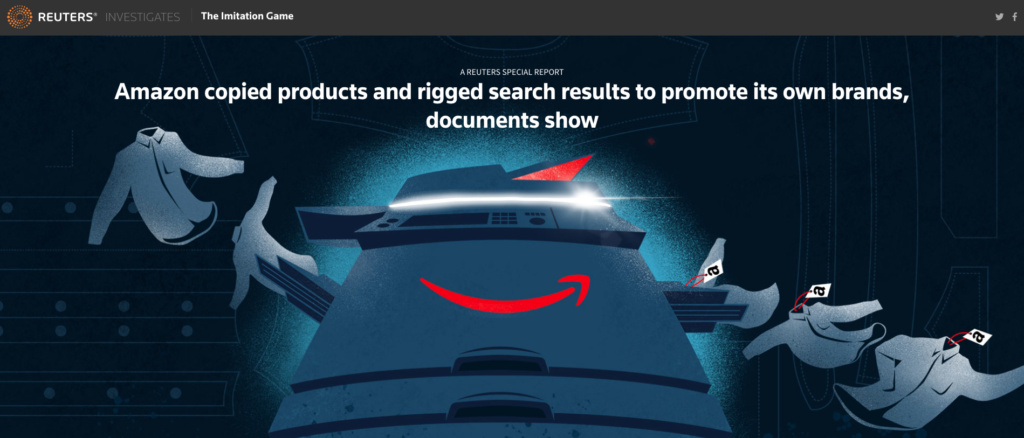
Source: Reuters
Amazon has been allegedly accused of learning what sells best to create knock-off products under its brands and rig search results to promote in-house brands and products above products millions of its sellers sell on the platform.
What can sellers do?
As millions of sellers continue to generate massive sales and revenue from Amazon, it will be difficult to cut ties with Amazon and go completely independent in the immediate future.
However, stores can and have been selling directly to consumers via their independent sites built on Shopify, Magento, WooCommerce, etc.
But the narrative has to come back to the insights that Amazon allegedly uses to its advantage—site search.
If there was one prominent factor (among many) that independent store sites lacked is site search.
And this is why we built Wizzy.ai—a search wizard that understands your product catalog and what your shoppers search for. Wizzy is built on sophisticated AI and machine learning technologies that would cost a lot of money for each store owner to develop, but now, is relatively inexpensive to implement on any shopping site.
Here are a few ways Wizzy transforms site search for ecommerce stores
- Understand shopper intent: Wizzy helps your site better understand visitors’ intent and show them exactly what they want to buy.
- Personalised search experience: Increase sales in your store by making shopping experiences more personalised, faster, and reliable.
- Understands natural language: Wizzy’s NLU models understand search queries that are long and unstructured and improve search results by learning visitors’ search queries continuously. Meaning your visitors see relevant search results all the time.
- Offers smart suggestions: Wizzy enables your shoppers to quickly see smart suggestions relevant to every word they type on your search bar. Our popularity algorithm constantly understands what shoppers search and click, thereby improving search results continuously.
- Gives you in-depth, real-time analytics: Wizzy analytics allows you to understand why a sale happened, why a sale didn’t happen, and understand how many searches directly led to sales. All in real-time. Wizzy also tracks visitor behavior and generates insights you can use to make positive changes to your business.
- Easy to integrate and run: Use Wizzy on any platform, even on a custom-coded website, with 100% smooth integration and support. And increase your product visibility by maintaining a clean catalog.
- And more.
Visit Wizzy.ai to learn more or request for a personalised demo by clicking here.


